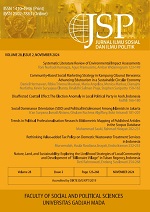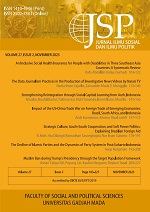The Intertwining of Educational Dualism in post-New Order Indonesia
Suzanna Eddyono(1*)
(1) Department of Social Development and Welfare (PSdK), Faculty of Social and Political Sciences, Universitas Gadjah Mada
(*) Corresponding Author
Abstract
This study focuses on continuities and changes in the dualism of national education after the collapse of the New-Order Regime in 1998. It argues that the Indonesian dualism of education may serve as a significant context in shaping the existing tensions in citizenship education in post- New-Order Indonesia. Drawing from a thematic analysis of citizenship education documents, related policy, and interviews with authors and higher education teaching staff, this study echoes the latest observations that reveal a more intertwining than rigid separation of the continuing dualism of national education. Yet, unlike the previous studies that reveal the tensions in more Islamic-based education, in its response to a more secular and modern demand, this study further highlights the intertwining of the dualism of education palpable in the citizenship education policy in post-New-Order Indonesia. It further calls for policy makers and educators to evaluate the existing citizenship education curriculum and its implementation within the context of an intertwined educational dualism in Indonesia. As such, this paper further aims to highlight the urgency of considering broader cultural and political contexts and actors involved in the process of reproducing official narratives of Indonesianess in the national curricula.
Keywords
Full Text:
PDFReferences
Apple, M. W. (1992). The text and cultural politics. Educational Researcher, 21(7), 411-419.
Azra, A. (2007). Islamic Legal Education in Modern Indonesia. In R. M. Feener & M.E. Cammack (Eds.), Islamic Law in Contemporary Indonesia, Ideas and Institutions. Massachusetts: Islamic Legal Studies Program, Harvard Law Shool, Harvard University Press.
Banks, J. A. 2004. Introduction: democratic citizenship education in multicultural societies. In J. A. Banks (Ed.), Diversity and Citizenship Education. San Fransisco: Jossey-Bass.
Bénêi, V. (2005). Introduction: manufacturing citizenship-confronting public spheres and education in contemporary worlds. In V. Bénêi (Ed.), Manufacturing citizenship: education and nationalism in Europe, South Asia, and China. London, New York: Routledge, Taylor and Francis Group.
Buchori, M. & Malik, A. (2004). The Evolution of Higher Education in Indonesia. In P. G. Altbach & T. Umakoshi (Eds.), Asian Universities: Historical Perspectives and Contemporary Challenges. Baltimore, London: The Johns Hopkins University Press.
Castles, S. (2004). Migration, citizenship, and education. In J. A. Banks (Ed.), Diversity and citizenship education. San Fransisco: Jossey-Bass.
Eddyono, S. (2018). The representations of Indonesianness in post-new order Indonesia (1998-2016) (Doc to ral d is s ertation, University of Pittsburgh, 2018). Pittsburgh: USA: University of Pittsburgh.
Elson, R.E., (2009). “Another Look at the Jakarta Charter Controversy of 1945.” Indonesia 88 (October):105-30.
Faucher, C. (2006). Popular discourse on identity politics and decentralization in Tanjung Pinang public school. Asia Pacific Viewpoint, 47(2), 273-85.
Groeneboer, K. (1998). Gateway to the west: The Dutch language in colonial Indonesia 1600-1950. Amsterdam: Amsterdam University Press.
Hefner, R.W. (2010). Muslim schools, social movements, and democracy in Indonesia. In M. S. Merry & J. A. Milligan (Eds.), Citizenship, identity, and education in Muslim communities. New York: Palgrave Macmillan.
Jackson, E., & Bahrissalim. (2007). Crafting a new democracy: civic education in Indonesian Islamic universities. Asia Pacific Journal of Education, 27(1), 41-54.
Jackson, E., & Parker, L. (2008). ‘Enriched with knowledge’: modernisation, Islamisation and the future of Islamic education in Indonesia. Review of Indonesian and Malaysian Affairs, 42(1), 21-53.
Kraince, R. G. (2007). Islamic Higher Education and Social Cohesion in Indonesia. Prospects, 37(3), 345-356.
Lemhanas. (1992). Kewiraan untuk mahasiswa. Jakarta: PT Gramedia.
Liddle, R. W., & Mujani, S. (2013). Indonesian democracy: from transition to consolidation. In Künkler, M. & Stepan, A. (Eds.), Democracy & Islam in Indonesia. New York: Columbia University.
Lukens-Bull, R.A. (2001). Two sides of the same coin: modernity and tradition in Islamic education in Indonesia. Anthropology & Education Quarterly, 32(3), 350-372.
Murray, R. T. (1988). The Islamic revival and Indonesian education. Asian Survey 28(9), 897-915.
Parker, L. & Raihani, R. (2011). Democratizing Indonesia through education? Community participation in Islamic schooling. Educational Management Administration & Leadership, 39(6), 712-732.
Parker, L. (2010). Some inspirational efforts are being made to promote inter-religious understanding, but state schools are way behind. Inside Indonesia, 102(Oct-Dec), 1-7. Retrieved from www.insideindonesia.org/ teaching-religious-tolerance?
Pohl, F. (2009). Interreligious harmony and peacebuilding in Indonesian Islamic education. In C. J. Nontiel & N.M. Noor (Eds.), Peace psychology in Asia. Springer Science and Business Media, LLC.
Purwanta, H. (2017). Militeristic discourse in secondary education history textbooks during and after the Soeharto era. Journal of Educational Media, Memory, and Society Spring, 9(1), 36-53.
Raihani. (2014). Creating multicultural citizens: a portrayal of contemporary Indonesian education. London, New York: Routledge.
Raillon, F. (2011). The return of Pancasila: secular vs. Islamic norms, another look at the struggle for state dominance in Indonesia. In M. Picard & R. Madinier (Eds.). The politics of religion in Indonesia: syncretism, orthodoxy, and religious contention in Java and Bali. London, New York: Routledge.
Riessman, C. K. (2008). Narrative methods for the human sciences. Thousand Oaks, New Delhi, London, and Singapore: Sage Publications Ltd.
Rosidin, D. N. (2013). Muslim fundamentalism in educational institutions: a case study of Rohani Islam in high schools in Cirebon. In J. Burhanudin & K. van Dijk (Eds.) Islam in Indonesia: contrasting images and interpretations. Amsterdam: ICAS/ Amsterdam University Press.
Sirozi, M. (2004). Secular-religious debates on the Indonesian national education system: colonial legacy and a search for national identity in education. Intercultural Education, 15(2), 123-137.
Picard, M., (2011). “Introduction: ‘Agama, ‘Adat’, and Pancasila.” In R. Madinier & M. Picard. The Politics of Religion in Indonesia: Syncretism, Orthodoxy, and Religious Contentions in Java and Bali. Oxon and New York: Routledge.
Ramage, D.E., (1995). Politics in Indonesia: Democracy, Islam and the Ideology of Tolerance. London and New York: Routledge.
Song, S.W. (2008). Back to basics in Indonesia? Reassessing the Pancasila and Pancasila state and society, 1945-2007. (Doctoral dissertation, Ohio University, 2008). Ohio, USA: Ohio University.
Soysal, Y. N., Bertilotti, T., & Mannitz, S. (2005). Projections of identity in French and German history and civic textbooks. In H. Schissler & Y. N. Soysal (Eds.), The nation Europe and the world: textbooks and curricula in transition. New York, Oxford: Berghahn Books.
Subagya, Y.T. (2015). Support for ethno-religious violence in Indonesia . Yogy akarta, Nijmegen: Universitas Sanata Dharma and Radbound University.
Suwignyo, A. (2014). Indonesian national history textbooks after the New Order: what’s new under the sun?. Bijdragen tot de Taal, Land, en Volkenkunde, 170(1), 113-131.
Ubaedillah, A. & Rozak, A. (2012). Pendidikan kewarga[negara] dan civic education: Pancasila, demokrasi, HAM, dan masyarakat madani. Jakarta: Indonesian Center for Civic Education (ICCE) UIN Syarif Hidayatullah Jakarta and Prenada Media Group.
Yusuf, M. & Sterkens, C. 2015. Analysing the state’s laws on religious education in post-New Order Indonesia. Al-Jāmi’ah: Journal of Islamic Studies, 53(1), 105-130.
Article Metrics
Refbacks
- There are currently no refbacks.
Copyright (c) 2019 Jurnal Ilmu Sosial dan Ilmu Politik

This work is licensed under a Creative Commons Attribution-NonCommercial-NoDerivatives 4.0 International License.























